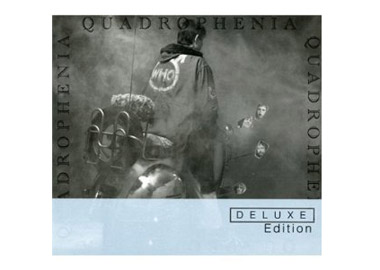The Who
Quadrophenia [Deluxe Edition]
(Geffen)
In addition to a remastered version of the 1973 album, the deluxe edition of Quadrophenia includes Pete Townsend’s original demo for his epic work. Coming after his ground-breaking rock opera Tommy and the never quite realized follow-up Lifehouse (parts of which were released as Who’s Next), Quadrophenia is Townsend’s most memoir-like work, telling the story of drug-addled, sex-obsessed, status-conscious teen in 1960s England. As great as the original work is, stripped of Roger Daltrey’s machismo-drenched vocals, Keith Moon’s crazy Cockney characterizations, and the lush arena-rock instrumentals, the demo version is more personal and introspective. It includes a number of never-before-heard tracks that help make the narrative clearer, but also foreshadow the middle-aged Townsend’s fascination with musical theater. This combination of enhanced intimacy and a penchant for the dramatic makes for a rich and rewarding second look at the rock classic. —Mark Roessler
Lisa Palumbo
River
(independent)
As a veteran of the Valley groups Lisaband, Cerillos Road and Page Six, Florence singer/ songwriter Lisa Palumbo is no stranger to the local music scene. And on her new solo disc, she takes center stage with a mix of upbeat pop and folk rock songs that are quite immediate in their display of charm. From the bouncy “Mourning Song” to the piano-based “Water” and on the radio-ready title cut, Palumbo displays a relaxed confidence that invigorates even the most familiar-sounding material with a life of its own. Helped along by bandmates Greg Eramo (drums), Tom Sturm (acoustic guitar, piano, vocals), Conor Dowling (bass, vocals), Lesley Smith (vocals) and Russell Chudnofsky (electric guitar and slide), most tracks feature very hummable melodies and lyrics that focus on Palumbo’s day-to-day life. It’s the kind of music that feels timeless, even if you’re hearing it for the first time. —Michael Cimaomo
Gary Clark, Jr.
Blak and Blu
(Warner Bros.)
When your chosen genre is one that’s plagued by musical cliche, it’s tough to remain true to tradition and simultaneously innovate. Somehow that’s exactly what Gary Clark, Jr. does in most of his songs. His music primarily hails from the blues end of the flowchart, but it’s a brand of blues that’s wide-ranging, often incorporating poppy elements of R&B. Clark’s main weapon is his monstrous guitar tone—it’s a fat slab of sound, tinged with fuzz and overdrive. He wields that weapon with sure-handed, rhythm-fueled grace. It’s never fair to reduce a player to what influences he might combine, but there’s a ghost on these recordings that’s openly acknowledged and spectacularly difficult to invoke well: Jimi Hendrix. Clark often employs high, wailing notes and diving, screaming sounds on the verge of feedback. Somehow, this seems more like a continuation of the Hendrix tradition than a borrowing. Perhaps that’s because of context: Clark uses such tones to dress up songs that otherwise live comfortably in the soul and R&B world. There’s no mere guitar wankery here. It’s a combination that makes something unusual and worthy: rock-drenched soul, straight out of the blues. —James Heflin



